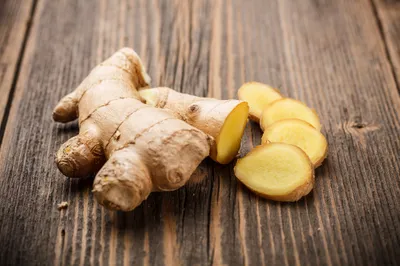Most everyone has suffered from nausea at some point in his or her life. Defined as “an uneasiness of the stomach that often comes before vomiting,” there are a multitude of reasons a person may experience this discomfort. According to WebMD, some of the most common causes include motion or seasickness, emotional stress, food poisoning, and infections such as the stomach flu.
If the cause of your nausea is mild in nature, home remedies are often all that’s needed to help the feeling subside. Be sure to keep these six natural treatments close at hand to help you achieve fast relief of your symptoms.
1. Ginger
According to the University of Maryland Medical Center, the Chinese have been using ginger to treat ailments such as stomach upset, diarrhea and nausea for over 2,000 years. And for good reason! Consuming ginger—whether it is the raw root, in supplement form, or in an all-natural ginger ale—“promotes the secretion of various digestive juices/enzymes that help neutralize stomach acid,” says EverydayRoots.com. It also contains phenols, which “relax stomach muscles and act similar to a sedative on irritated stomach tissue, reducing over activity of the stomach.”
To make ginger tea, wash and peel a two-inch piece of ginger root and cut into small pieces. Bring 2-3 cups of water to a boil over medium-high heat, then add the ginger and let boil for 3-5 minutes. Once removed from the heat, you can either strain the tea or pour directly into a mug. Add a touch of honey, if needed.
2. Peppermint
Like ginger, peppermint has been used to treat health issues for thousands of years. Its calming and numbing effect make it popular for treating ailments such as Irritable Bowel Syndrome (IBS), itching and skin irritation, tension headache, as well as colds and flus. For this reason, it is often added to toothpaste, tea and chest rubs.
When it comes to aiding indigestion, the University of Maryland Medical Center indicates that peppermint “calms the muscles of the stomach and improves the flow of bile, which the body uses to digest fats. As a result, food passes through the stomach more quickly.”
While peppermint is available as a tea and in capsules, for fast relief of nausea EverydayRoots.com says that you should dip a cotton swab in a few drops of peppermint oil and apply it directly onto the gums.
3. Chamomile
Chamomile contains compounds with spasmolytic properties, which, according to Livestrong.com, means that tea made from its leaves “can relax the smooth muscle of the intestines.”
Chamomile also aids nausea by acting as an anti-inflammatory. These properties “help your stomach muscles relax, which can reduce the pain of cramping and spasms,” says Healthline.com. So, the next time you feel a wave of nausea coming on, curl up and relax with a cup of chamomile tea.
4. Lemon
There are several ways that lemon can help to calm feelings of nausea. The first is by slicing a fresh lemon. Position the cut lemon close to you and take deep breaths, fully inhaling and exhaling. According to EverydayRoots.com, “the smell of citrus can cut through the murky feeling of nausea, calm your stomach, and calm you.” Alternatively, the source says, you can suck on a slice of fresh or frozen lemon for the same benefits.
HomeRemedyHacks.com also recommends squeezing fresh lemon juice into a cup of water, along with a pinch of salt. Adding salt, the source says, “will help in boosting exhausted electrolytes, which might cause a salt imbalance in the body.”
5. Follow the BRAT Diet
If you’re experiencing nausea as a result of the stomach flu or food poisoning, the BRAT diet may be beneficial in calming your upset stomach. The diet—which consists of bananas, rice, applesauce (unsweetened) and toast—is made up of bland, low-fiber foods that bind well to keep your stomach feeling comfortably full when you’re not able to eat much.
If your body is able to keep these four foods down, EverydayRoots.com suggests the BRATPP diet, which means adding lightly buttered/oiled pasta and potatoes to the abovementioned items.
6. Apple Cider Vinegar
Depending on the extent of your nausea, this home remedy may be more challenging to take, as apple cider vinegar can be quite tart. But Healthline.com says that the acids it contains help to neutralize an upset stomach and “may help decrease starch digestion, allowing the starch to get to the intestines and keep the bacteria in the gut healthy.”
The source recommends taking the liquid directly by the tablespoon, but if this proves to be too strong for you, mix it into a cup of water along with a teaspoon of honey and drink slowly.





